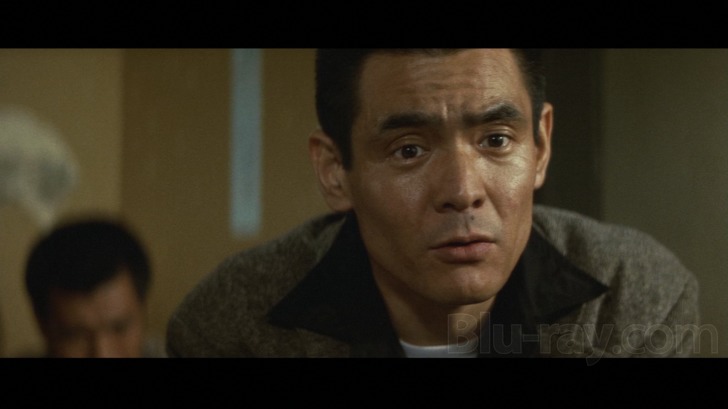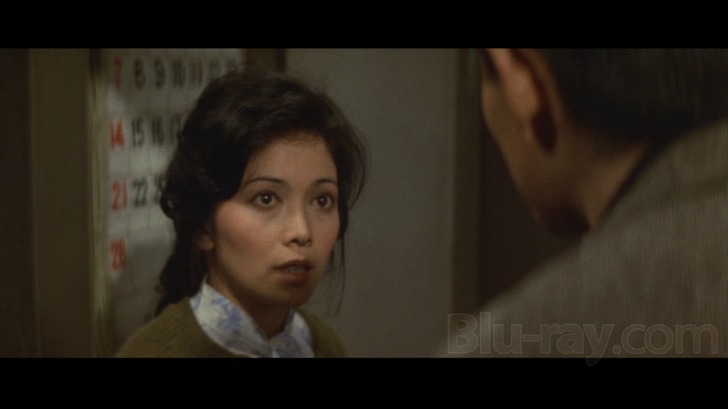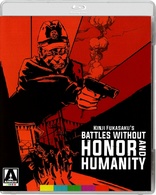Battles Without Honor and Humanity Blu-ray Movie
HomeBattles Without Honor and Humanity Blu-ray Movie 
Blu-ray + DVDArrow | 1973 | 99 min | Not rated | Aug 09, 2016
Movie rating
7.3 | / 10 |
Blu-ray rating
| Users | 0.0 | |
| Reviewer | 4.0 | |
| Overall | 4.0 |
Overview
Battles Without Honor and Humanity (1973)
Kinji Fukasaku directed this powerful and uncompromising look at the deadly stakes of life among the Yakuza. Shozo Hirono is a former Japanese soldier who, following his nation's defeat in World War II, finds himself in a prison cell in Hiroshima on a murder charge. While behind bars, Hirono gains a loyal friend in fellow criminal Wagasugi
Starring: Bunta Sugawara, Hiroki Matsukata, Kunie Tanaka, Tsunehiko Watase, Nobuo KanekoDirector: Kinji Fukasaku
| Foreign | 100% |
| Drama | 43% |
| Crime | 15% |
| Action | Insignificant |
Specifications
Video
Video codec: MPEG-4 AVC
Video resolution: 1080p
Aspect ratio: 2.35:1
Original aspect ratio: 2.35:1
Audio
Japanese: LPCM Mono (48kHz, 24-bit)
Subtitles
English
Discs
Blu-ray Disc
Two-disc set (1 BD, 1 DVD)
DVD copy
Playback
Region A, B (locked)
Review
Rating summary
| Movie | 4.0 | |
| Video | 3.0 | |
| Audio | 3.5 | |
| Extras | 2.0 | |
| Overall | 4.0 |
Battles Without Honor and Humanity Blu-ray Movie Review
Reviewed by Jeffrey Kauffman August 15, 2016Chances are unless you’re a major fan of Asian cinema you may not be overly familiar with the name Kinji Fukasaku. That may be even more ironic since one of Fukasaku’s best known efforts isn’t even “real” Asian cinema, it’s (some of) the Japanese segments of the almost preposterously over produced “joint effort” between the United States and Japan that sought to recreate the horrors of December 7, 1941, 1970’s Tora! Tora! Tora!. Tora! Tora! Tora!’s “claim to fame” at the time of its release was how it supposedly was going to give “both sides” of the equation which led to the United States finally entering the fracas of World War II, and part of that “fair and balanced” approach was putting some actual Japanese folks in charge of segments dealing with that nation’s wartime empire building. Interestingly, Fukasaku and his cohort Toshio Masuda were only brought on to the project after iconic director Akira Kurosawa was shunted aside when it was felt his artistic sensibility wasn’t in tune with what was planned as a spectacular big budget epic. That vagary of the film industry notwithstanding, it’s at least a little meaningful that Kurosawa’s name is recognized even by those who don’t care one whit about so-called “world cinema”, while Fukasaku’s name has yet to really resonate for a large swath of the international film going community. Fukasaku’s “other” claim to fame, at least in terms of notoriety, is probably his final film, 2000’s Battle Royale, a film (based upon a novel) which predated The Hunger Games 4-Film Complete Collection by over a decade (in the film versions, that is), but which bears more than a passing resemblance to the Suzanne Collins efforts. Just a couple of years after he helped to recreate the events leading up to the attack on Pearl Harbor, Fukasaku embarked on a relatively brief but intense run of yakuza films which have become lumped under the rubric The Yakuza Papers, a reference to the memoirs of Kōzō Minō, a real life yakuza whose “diary” of sorts became fodder for a series of newspaper exposés and then five films helmed by Fukasaku. While manifestly different from Francis Ford Coppola’s The Godfather Collection, The Yakuza Papers pentalogy does offer at least a few similarities, including vicious internecine warfare, monolithic leaders of various crime families and an attempt to place the events within a larger historical context. Fukasaku’s films tend to focus more directly on Japan’s post-War malaise, as might be expected, and the entire series is notable for its gritty and depressive demeanor, something that is distinctly at odds with many previous, more heroic, depictions of the yakuza. Arrow released a Battles Without Honor and Humanity: The Complete Collection box set late last year but is now releasing each of the five films separately.

One manifest difference between Battles Without Honor and Humanity (and, frankly, its follow ups) and The Godfather films is the sheer scope of the story, including a character list that is at times rather hard to divine, even with freeze frames and explicatory text helping to define who each person is. The film begins in the aftermath of World War II, when it’s suggested that the collective “loss of face” for the Japanese helped to give rise to a new, more aggressive, form of criminal activity. All of the Yakuza Papers films mix events and people that are at least based on real life if not actually imitative of them, and Battles Without Honor and Humanity’s supposed focal character is Shozo Hirono (Bunta Sugawara), a veteran sucked into the yakuza lifestyle who is reportedly based on Kōzō Minō.
Battles Without Honor and Humanity starts out with a flurry of chaotic activity and rarely lets up with it after this cacophonous introduction. A number of characters are quickly introduced (perhaps too quickly for some—this is a film and series which require a bit of re-viewing at times), and the anxiety fueled environment of post-World War II Japan is ably detailed (including some none too flattering snippets about American GIs). The labyrinthine assortment of characters and plot mechanics may in fact not always be entirely clear, at least on first viewing, but the upshot is that Shozo ends up in prison where he initially becomes a “blood brother” with a member of a major crime family. That sets Shozo out on a “career” of sorts, one that Battles Without Honor and Humanity documents with a clear eyed detachment that probably only adds shock value to sequences like one where Shozo engages in a bit of ritual amputation to apologize for a perceived error.
The film moves through several years, including the Korean conflict, documenting the at times incredibly baroque finagling of various crime families as they compete for power and (perhaps more importantly) territory. There are several kind of rote plot points on display in Battles Without Honor and Humanity, but the film is so viscerally violent and manically edited at times that things land with incredible force most of the time. It’s notable that the opening credits play out over scenes of destruction wrought by the atomic bomb, for the subtext of Battles Without Honor and Humanity and its sequels is that men like Shozo Hirono were products of the sociopolitical and socioeconomic tenor of the times, inextricably woven into a fabric that was inevitably frayed after the fracas of World War II. As such, the film is probably as much a neorealist exposé of post-war angst as it is a riveting document of a life of crime.
Battles Without Honor and Humanity Blu-ray Movie, Video Quality 

Battles Without Honor and Humanity is presented on Blu-ray courtesy of Arrow Video with an AVC encoded 1080p transfer in 2.35:1. Perhaps because the films have now been released individually without any accompanying supplementary swag like a book, there's no information on the provenance of the master and transfer as is the usual custom with Arrow releases. That said, the look here is generally very organic, though it looks like the source elements have faded a bit, as evidenced by a tendency for things like flesh tones to alternate between brownish or a more peach colored tone. Elements are actually in great condition from a damage standpoint, with very little if anything to distract from the image. As can be seen in several of the screenshots accompanying this review, Fukasaku and cinematographer Sadaji Yoshida tend to favor cluttered framings that often feature several characters, with focus pulling (evidently on the fly) helping to establish to whom the audience should be paying attention. That tendency sometimes gives at least the perception of softness, since focus is variable and is frankly a little problematic even after it's "set". There's a somewhat heterogeneous look in terms of clarity and grain structure at times as well; contrast some of the clearer screenshots (e.g., 4 and 5 to cite just two) with some of the other, softer, shots (e.g., 2 and 9) for some indication of the variances on display. Detail levels are variable as well, never really rising to spectacular but often looking at least good to very good. Generally speaking, though, this is a solid accounting of the film and one that doesn't suffer from any obvious overly aggressive digital manipulation. I'd probably inch my score up toward the 3.25 range if I were able to.
Battles Without Honor and Humanity Blu-ray Movie, Audio Quality 

Battles Without Honor and Humanity features an uncompressed LPCM mono track in the original Japanese. There's some very slight distortion that tends to be most noticeable when some of the brass heavy (and kind of retro-sixties sounding) cues by composer Toshiaki Tsushima are playing. Otherwise, the soundtrack, while noisy and busy a lot of the time, offers considerable dynamic range and decent if never overwhelming fidelity. Dialogue is rendered cleanly, though, again, the film has an almost Howard Hawks-ian approach at times, with overlapping interchanges.
Battles Without Honor and Humanity Blu-ray Movie, Special Features and Extras 

- Audio Commentary features Stuart Galbraith.
- Yakuza Graveyard (1080p; 10:54) is a 2015 interview with Takashi Miike.
- Theatrical Trailer (1080p; 3:17)
Battles Without Honor and Humanity Blu-ray Movie, Overall Score and Recommendation 

As much of a phenomenon as The Godfather was when it first came out in 1972, looking at it now from the vantage point of several decades helps to point out that despite its provocative subject matter and its then young and equally provocative director, the film was really kind of a throwback to Golden Era Hollywood glamor (albeit with lots of dead bodies accruing). There's something quite different at play in Battles Without Honor and Humanity, something I'd tend to compare more to the Italian neo-realists, with an emphasis on political, economic and societal changes that were ushered in by Japan's defeat in World War II. This first film is stuffed to the gills with characters and subterfuge, and some may feel the need for a flowchart to keep everything straight, but Battles Without Honor and Humanity offers a rare and disturbing kind of impact that is often missing from even the grittiest crime films. Video quality is a little spotty at times, but on the whole Battles Without Honor and Humanity comes Highly recommended.
Other editions
Battles Without Honor and Humanity: Other Editions
Similar titles
Similar titles you might also like

Hiroshima Death Match
Battles Without Honor and Humanity - Deadly Fight in Hiroshima
1973

Proxy War
Battles Without Honor and Humanity
1973

Police Tactics
Battles Without Honor and Humanity
1974

Final Episode
Battles Without Honor and Humanity
1974

New Battles Without Honor and Humanity
新仁義なき戦い / Shin jingi naki tatakai
1974

New Battles Without Honor and Humanity: The Boss' Head
新仁義なき戦い 組長の首 / Shin jingi naki tatakai: Kumicho no kubi
1975

New Battles Without Honor and Humanity: Last Days of the Boss
新仁義なき戦い 組長最後の日 / Shin jingi naki tatakai: Kumicho saigo no hi
1976

Cops vs Thugs
Special Edition | 県警対組織暴力 / Kenkei tai soshiki bōryoku
1975

Shinjuku Triad Society
1995

Female Prisoner #701: Scorpion
1972

Rainy Dog
1997

Ley Lines
1999

Massacre Gun
Minagoroshi no kenjû
1967

Graveyard of Honor
Jingi no hakaba
1975

Black Dagger
1968

Kill!
1969

Gangster VIP
1968

Gangster VIP 2
1968

Female Prisoner Scorpion: Beast Stable
1973

Street Mobster
現代やくざ 人斬り与太 / Gendai yakuza: hito-kiri yota
1972

